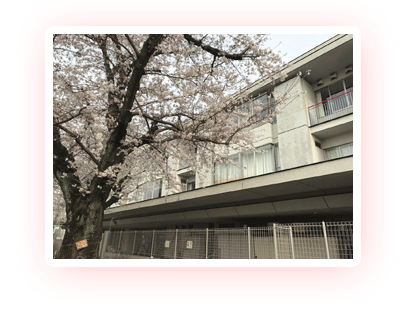40. SPORTS DAY!
Last weekend was my eldest daughter’s Sports Day. She attends our local public elementary school and is in first grade, so this was her first big event with her new school. You can imagine how excited she was!
A question mark had hung over the weather all week, and we had canceled our Sunday plans, totally expecting Saturday rain to postpone the day. But come Saturday morning, the clouds stayed away and a hot sun blazed down. Thankfully a light breeze offered some relief from the early summer heat.
Among the several things my daughter and I have in common is the fact that this Sports Day was a first for both of us! For 24 years the students in my classes had talked about their Sports Days, but I had never been given an opportunity to actually attend one myself.
I must say, I was very impressed with the drama and the fanfare of the Opening Ceremony. The two teams (The Red Team and The White Team) were introduced with passionate drum-beating and almost warrior-like chanting. The rivalry between them appeared serious, but with courtesy and mutual respect.
The support and encouragement given to the participants of each race and event as the day progressed was outstanding. It was the ultimate display of true sportsmanship. As we watched, my family and I got nicely caught up in it all, and I barely noticed the sunburn slowly creeping on my neck!
I cheered my daughter on during her race, and watched with pride as she finished 3rd place out of four runners (that’s another similarity between us! In my day, that was always my result too!)
And in between her race and class dance performance, there was plenty for me to cheer because in fact many of my weekly students also attend this school! It was great seeing a different side to so many familiar faces! Students who are usually quiet in class, now appeared on the race-track sidelines cheering their team-mates on with fervor and amazing voice-volume! And those students who are usually noisy in class were now also noisy outside of class! One of my boys was in fact the head of the Red Team Supporters (Ouen-Dancho)! He led the chanting and Red Team encouragement with a voice that I swear could be heard across the whole neighborhood!
Something else struck me about my students throughout the day. I noticed that just about all of them were extraordinarily friendly and comfortable communicating to a large number of different people; adults of all ages and other kids of all grades. My students displayed great social skills and appeared very willing to exchange words and a smile with anybody at all. Of course, their language on this day was Japanese, not English, still I was amazed at how they made themselves so popular and likeable. I felt myself feeling as much pride for them as for my own daughter!
On my way out of the school after the Closing Ceremony, I bumped into the mother of the Ouen-Dancho. I congratulated her on her son’s terrific performance. He was the perfect Dancho, I told her.
Her reply surprised me:
“Thanks to your lessons, my son has totally changed. He used to be shy and had no confidence speaking in front of a group. Now he is Dancho! Thank you so much for developing his confidence!”
Her words rounded off a perfect day, and the bath and beer I had when I got home (ice cream for my daughters) were fantastic.
It would be nice to take all the credit for my students’ progress. But much credit must go to LEARNING WORLD. No other textbook comes close in terms of giving students activities that involve communication and interaction, encourage acceptance and respect for others and at the same time build self-esteem!
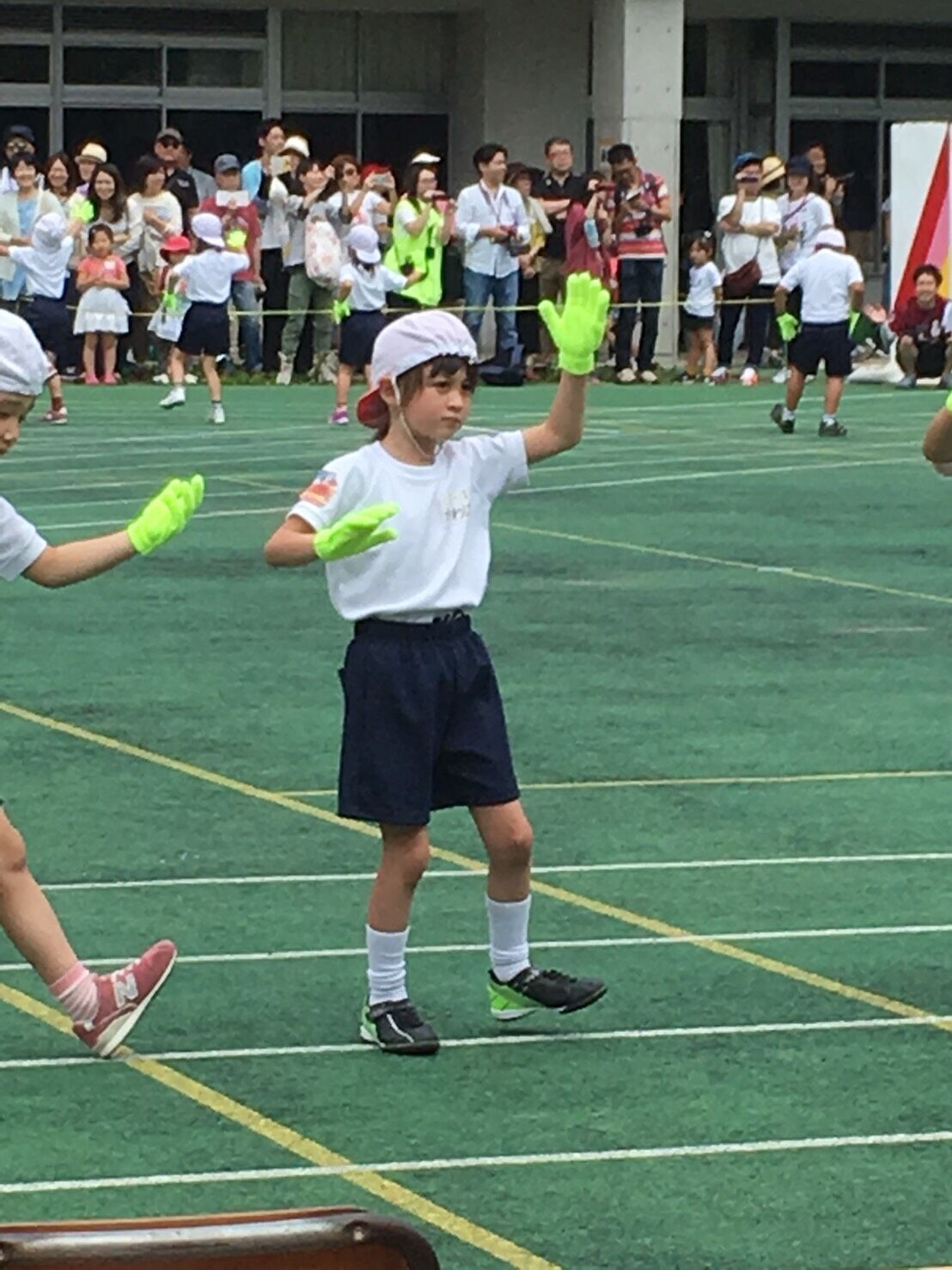
39. APRICOT MATES MEETING!
I love the timing of Golden Week. It comes exactly one month into the new school year.
Every first month of every new school year requires new adjustments, new assessments and new stresses. By the time Golden Week comes we have more or less accustomed ourselves to these and we can briefly relax before getting into the year ahead in earnest.
By and large I have settled nicely into my new preschool responsibilities and am enjoying it very much. There is much hard work ahead!
Away from the classroom, the APRICOT Mates Meeting is less than a month away!
This meeting will celebrate the organization’s 5th anniversary, and I’m looking forward to it very much.
The program this time includes more activities for participants than ever before.
Of these, one I feel has particular value is the “Speech Time” activity.
Here participants share their current situation and past experiences.
I’m personally very interested in hearing what teachers are concerned about regarding their teaching; the areas of teaching that teachers feel they want more insight on.
I’m keen to hear this because up to now, the basis of all my presentations for APRICOT has been MY own experiences, and not those of other teachers.
So if you are a qualified APRICOT Mate and are attending this meeting, please give thought to this segment because it will have an impact on future APRICOT seminars!
Let’s all have a great first term!
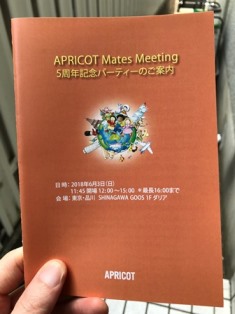
*The APRICOT Mate Meeting is only open to those who have completed Mikiko Nakamoto’s Children’s English Teacher Training Course, are Learning World certified schools, and have applied to and been accepted as APRICOT Mates.
38. HAPPY NEW (SCHOOL) YEAR!!
HAPPY NEW (SCHOOL) YEAR!!
I hope all your goals and objectives for yourself and your students come true this year!
Well the big news from me is that from today I’ve returned to being a full-time teacher!! For the last 8 years I’ve been working only part-time in my school – afternoon elementary school kids classes only. Before that I was full-time as the main teacher in one of the pre-school morning classes. From today I’ve returned to those responsibilities!! It’s Back-to-Pre-School or me!!
Understandably I was rather nervous all weekend! Over the last 8 years I’ve gained good insight into various aspects of teaching, and my classes had included many preschool aged students, but being responsible for the same group of 3~5 year-old kids every day from 10:00~2:30 requires energy and focus that I’m not used to, and of course I’m also 8 years older…!
To my great relief it wasn’t as stressful as I was expecting, and I fell right back into the necessary frame of mind!
My class has 17 kids. 11 of them come every day. 6 of them come once a week. Today there were 12 kids. The very first thing I did was make an effort to remember all of their names!! They were perhaps as nervous as I was, but we worked well together and got accustomed to each other quite quickly. They’re very cute!!
Going back to preschool full-time will provide many interesting classroom experiences to share with you here!!
I can already tell: THIS YEAR IS GOING TO BE a BIG, BIG YEAR!!
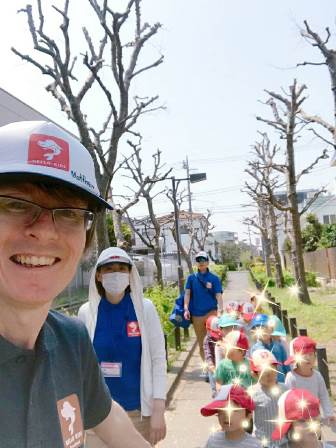
37. End of the School Year…
Well well well! The cherry blossoms are in full bloom and another school year has come to an end!
How was everybody’s year? I hope your year was fruitful!
In truth my year this year was a bit frustrating because I needed to split my energy and attention to a range of issues not related to teaching, and so my blog entries became few and far between…
To my surprise I learned recently at the
LEARNING WORLD Workshops that my blog actually has a fairly substantial readership (- for a long time I truly believed that absolutely nobody was reading it!) so to you out there reading this, I apologize for my slackness.
In iCloud I have a folder full of ideas I wanted to share with you on this blog, but haven’t yet gotten round to doing so… But there’s good news!
From April, my work situation will be such that time for my blog can be made! There are some big changes and new challenges waiting for me this year starting from next week – and there should be time to write about my experiences! I’ll share the details of my work situation in my first entry of the new school year, which I’m planning to post early next week.
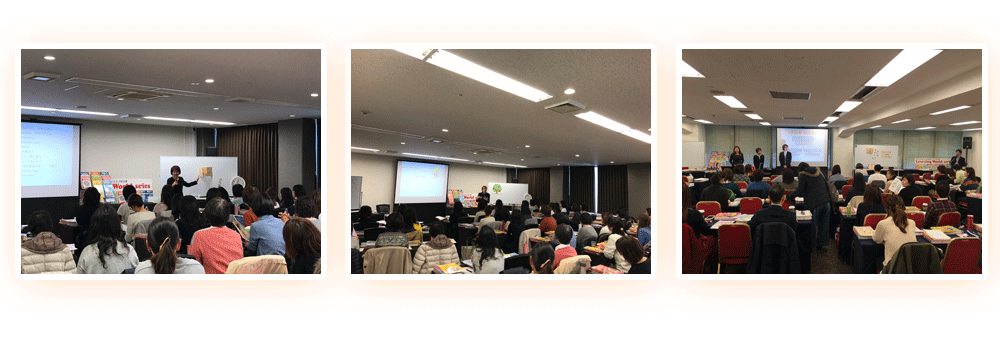
In the meantime I’d like to thank everybody at APRICOT for their continued hard work and commitment to supporting Japan’s English teachers. I’m looking forward to working with you again from April! Let’s make some big plans and big changes in Japanese English education!
I’d also like to thank all those teachers who attended the LEARNING WORLD Workshops in Tokyo, Osaka and Nagoya. I hope you were able to take home some ideas and inspiration. And a BIG thank you to Manta-sensei for sharing the presentation responsibilities in the Spring series!
As always, I’d like to thank Kawahara-sensei for having all the insight and knowhow that she has, and for her tremendous encouragement and support for not just me but for so many of us! I sincerely hope there’s recognition for all of her effort. So many of us rely heavily on her! (Where would we be without you, Hiromi? I hope your future brings you what you deserve and more!)
And lastly, thank you to you, this blog’s readers. If you’re reading this, it means we share a passion for our work in the classroom. I hope the school year was a good school year for you, and may even more success await you from April!

36. This student is in the wrong class
February… What a month!!
February is “report month”. Every student in the school where I work gets a report written about them. Their parents read them – I believe. I write about each student’s strengths and achievements this year. I write about their communication strategies in the classroom. I write about their relationships with their teacher and with their classmates. I write about aspects of their behavior in the classroom they should consider changing. I write about what they can expect next year. There is so much to write about, but I hope parents appreciate that it’s really hard to put words to describe the interaction between students and teachers, the learning process, and progress made. And to be honest, there are so many students that trying to find the precise wording to describe the students’ year for every line on every report would send me past the deadline…Under the circumstances I believe I do the best I can. I sometimes believe that it would be easier and quicker if I didn’t care…
What a bummer… I care!! *Sigh*
In the process of writing the reports I sometimes find myself trying to explain to parents why their child isn’t feeling much success with English. And too often I find myself thinking
“This student is in the wrong class”. What constitutes a “wrong class” exactly?
Well, if there is an obvious age gap between students, at least one of them is in the wrong class.
Also, if students’ school schedule is such that they can’t all start and end their lessons at the same time, at least one of them is on the wrong class.
The biggest factor however is experience. If the length and amount of experience between students varies greatly, at least one of them is in the wrong class. Allow me to elaborate on this last point.
When a class consists of students the majority of whom have several years of English lesson experience, having a new student with little or no experience enter this class will likely be a difficult situation for all, and especially for the new student. And while I don’t entirely discard the possibility that new, inexperienced kids may feel inspired and motivated by more experienced classmates who communicate well in English, I’ve very rarely seen this happen. On the contrary, newer, inexperienced kids usually become disheartened, demotivated and unconfident. You see, as a teacher, when I use English with my students it’s always with their feeling of success in mind. But when students use English with me or with other students, they don’t think about their classmates’ feeling of success. To new kids, their more experienced classmates come across as “fluent and confident” which is good if new kids can understand most of what they say in English. But usually they don’t. So they begin to feel inadequate and start believing “I can’t do this…”
In short, keep students with the same amount of experience together in one class. New kids should go to the new kids’ class.
For sure, it makes more business sense to put as many kids together in one class, especially if you need to hire a teacher for that class. However in the long term, this strategy is not good for business because new students will be difficult to retain.
Ah, February…
With my reports nearly finished, I’ll be able to start getting my thoughts and things together for the LEARNING WORLD Spring Workshops! First stop, Nagoya on February 25th! See you there!!!



















